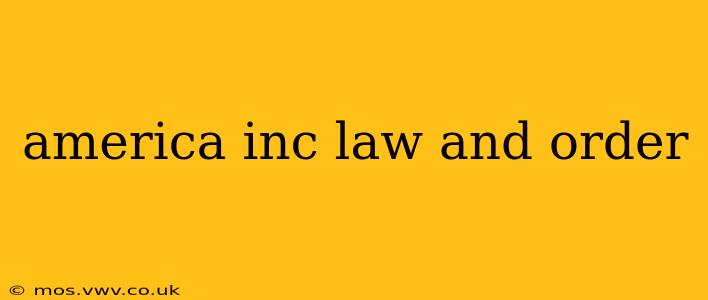America Inc., a term often used to represent the vast and powerful influence of corporations on American society, operates within a complex framework of laws and regulations designed to maintain order and prevent abuses of power. However, the relationship between corporate power and the legal system is far from straightforward, constantly evolving and sparking debate. This article explores the intricate interplay between American corporations and the legal frameworks that govern their actions, examining the challenges, successes, and ongoing controversies.
What Laws Govern American Corporations?
American corporations are subject to a multi-layered system of laws, including federal and state statutes, administrative regulations, and common law precedents. Key areas of legislation include:
- Corporate Law: This governs the internal operations of corporations, including formation, governance, and shareholder rights. State laws primarily dictate these aspects, leading to variations across jurisdictions.
- Securities Law: This regulates the issuance and trading of corporate securities, aiming to protect investors from fraud and manipulation. The Securities and Exchange Commission (SEC) plays a crucial role in enforcing these laws.
- Antitrust Law: This aims to prevent monopolies and promote competition, ensuring a fair marketplace. The Sherman Act and Clayton Act are cornerstones of this legislation.
- Environmental Law: This imposes regulations on corporate environmental practices, aiming to protect natural resources and public health. The Environmental Protection Agency (EPA) enforces many of these regulations.
- Labor Law: This protects the rights of workers, including minimum wage, working conditions, and the right to organize. The National Labor Relations Board (NLRB) is responsible for enforcing these laws.
How Effective is Law Enforcement Against Corporate Crime?
While the legal framework is extensive, its effectiveness in combating corporate crime remains a subject of ongoing debate. Challenges include:
- Complexity of regulations: The sheer volume and complexity of laws governing corporations can make compliance difficult and create loopholes for exploitation.
- Resource limitations: Enforcement agencies often lack sufficient resources to investigate and prosecute all instances of corporate wrongdoing.
- Powerful lobbying efforts: Large corporations can exert significant political influence, potentially hindering effective regulation and enforcement.
- Difficulties in proving intent: Proving criminal intent in corporate cases can be challenging, requiring evidence of conscious wrongdoing by individuals within the corporation.
What are the Consequences for Corporate Misconduct?
The consequences of corporate misconduct can be severe, ranging from:
- Fines and penalties: Significant financial penalties can be levied against corporations for violations of law.
- Criminal charges against individuals: Individuals within the corporation may face criminal charges, including imprisonment.
- Civil lawsuits: Corporations may face civil lawsuits from individuals or other entities harmed by their actions.
- Reputational damage: Negative publicity and loss of consumer trust can severely impact a corporation's profitability and long-term viability.
What Role Do Whistleblowers Play in Exposing Corporate Crime?
Whistleblowers play a vital role in exposing corporate misconduct. They often provide critical information that leads to investigations and prosecutions. However, whistleblowers often face significant risks, including retaliation from their employers. Laws like the Sarbanes-Oxley Act (SOX) provide some protection for whistleblowers, but further strengthening these protections is often advocated.
How Can Corporate Governance Improve Accountability?
Strong corporate governance practices are crucial for enhancing accountability. This includes:
- Independent boards of directors: Boards that are truly independent from management can provide effective oversight and challenge questionable decisions.
- Robust internal controls: Effective internal controls can help prevent and detect fraud and other misconduct.
- Ethical codes of conduct: Clearly defined ethical standards and guidelines can guide employee behavior and foster a culture of compliance.
- Transparency and disclosure: Open and transparent reporting practices can increase accountability and build trust with stakeholders.
Conclusion
The relationship between America Inc. and law and order is a dynamic and multifaceted one. While the legal framework seeks to curb corporate excesses and protect the public interest, challenges remain in effectively enforcing regulations and ensuring accountability. Ongoing efforts to strengthen laws, increase enforcement resources, and promote ethical corporate governance are crucial for maintaining a balance between fostering economic growth and safeguarding the integrity of the American system.
